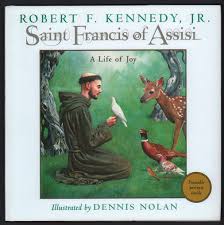RFK, Jr.’s Saint Francis
Listen to the Recess! Clip
| Author | John Cech |
| Air Date | 3/8/2006 |

RFK, Jr.’s Saint Francis Transcript
Sometimes it’s less a matter of our choosing the subjects that we write about, than it is the subjects that choose us. This is certainly what happened with Robert F. Kennedy Jr.’s latest book, St. Francis of Assisi, A Life of Joy. In his introduction to this new picture book, with illustrations by Dennis Nolan, Kennedy recalls: “My first memory — I was one year old — is of sitting below a statue of Saint Francis. . . in the garden of the Georgetown home where I was born.” Later, as an older child, Kennedy remembers, “My bedroom walls sported more than forty framed pictures portraying events from [St. Francis’] life. My mother and father read us stories of the ‘little flowers’ — the followers of Saint Francis. . . . Theirs were the primary virtues — courage, sacrifice, generosity, and love for the poor — that my parents sought to instill in their eleven children.”
Along with the same name (his middle name is Francis), Kennedy shares another bond (that of privilege) with his hero, the historical St. Francis, who was born in 1182 into a wealthy merchant family in Assisi, one of the prosperous hilltop towns of Northern Italy. We learn from Kennedy how the young St. Francis balanced his generous, fun-loving spirit with his aspirations to be a valorous knight. He even fought bravely in a war with the city of Perugia and was taken prisoner for a year before being returned to Assisi as a hero. But, in 1204, when he set out to join the army of Pope Innocent III, he was suddenly taken by a mysterious illness that left him too weak to fight, and that was soon followed by a vision about his true calling — which was not for war, but for peace. Soon Francis began to renounce all worldly possessions — which he happily gave away to the sick, the poor, the downtrodden — much to the consternation of his father, who had Francis publicly humiliated in the main square of Assisi, and stripped of all his belongings, including his clothes. Francis went to live in the woods, where, Kennedy writes, “he called the sun and moon his brothers. He wrote . . . poems and sang as he walked through the forests and fields. He made himself the poorest man in the world. But instead of being miserable, he became happier. ‘Blessed is he who expects nothing,’ Francis would later say, ‘for he will enjoy everything.’” Kennedy tells us the life of this remarkable human being in the sure, quick tones of a familiar parable — one that Kennedy had clearly been repeating to himself for a long, long time.